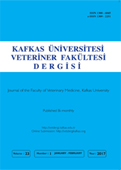
This journal is licensed under a Creative Commons Attribution-NonCommercial 4.0 International License
Kafkas Üniversitesi Veteriner Fakültesi Dergisi
2018 , Vol 24 , Issue 1
Characterization and Identification of Lactic Acid Bacteria by 16S rRNA Gene Sequence and Their Effect on the Fermentation Quality of Elephant Grass (Pennisetum purpureum) Silage
1Institute of Ensiling and Processing of Grass, Nanjing Agricultural University, Weigang 1, Nanjing 210095, CHINA
DOI :
10.9775/kvfd.2017.18504
The purpose of this study is to isolate and identify lactic acid bacteria from elephant grass (Pennisetum purpureum) silage
and examine their effect on the silage fermentation quality. Three of lactic acid bacteria strains were isolated from elephant
silage and their characterization, identification, and influence on silage quality after 90 d of ensiling was studied. All three
strains were Gram-positive, catalase-negative, and were grown in 6.5% NaCl and pH 4.00. Strains AZZ1, was identified as for
genus pediococcus, whereas, AZZ4 and AZZ7 strains were classified as genus Lactobacillus according to the phenotype, 16S
rRNA, and RecA gene analysis. Three strains were used as additives at 1.0×106 CFU/g of fresh material of elephant grass. Strain
AZZ4 is found to be the most effective in improving the fermentation quality of the elephant grass silage, as indicated by a
lower (P<0.0001) dry matter losses, pH value, water-soluble carbohydrates, acetic acid content, butyric acid, propionic acid
and ammonia-N. However, the lactic acid content was higher (P<0.0001) compared to the control and other treatments. In
conclusion, these results suggest that, for well-preserved silage, the isolates may be useful as inoculants for silage making, and
could play a major role in developing silage production.
Keywords :
Isolation, Identification, Lactic Acid Bacteria, Sequence, Silage Quality











